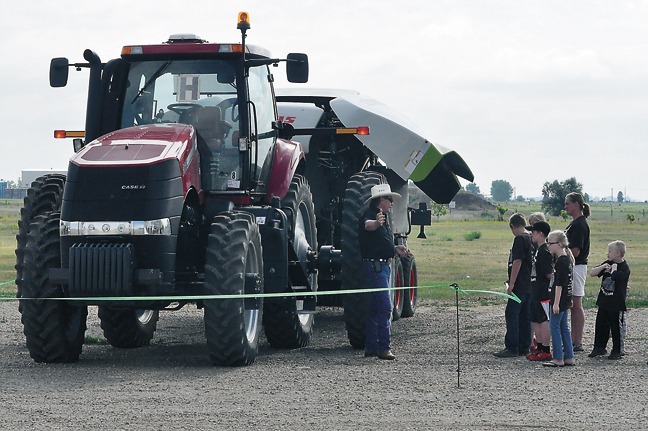Current Temperature
28.5°C
McCain Foundation invests $280,000 for U of L graduates
Posted on May 5, 2021 by Taber Times TIMES FILE PHOTO
TIMES FILE PHOTOBy Stan Ashbee
Taber Times
editor@tabertimes.com
Recently, the McCain Foundation Studentships for Sustainable Agriculture invested $280,000 for University of Lethbridge graduate students to further contribute to innovation in sustainable agriculture. The foundation, it was explained, is aimed at supporting and promoting master of science students in biology — whose research focuses on science and leadership in sustainable agriculture. With the announcement, the pilot project will fund a minimum of six graduate students for two years at $20,000 per year.
“The studentship offers training in experimental science with world-class researchers at the U of L, as well as novel courses and new networking opportunities. Students in the specialized cohort will conduct a thesis-based research project focusing on one of three major themes, including genetics, physiology and natural product chemistry, and environmental sciences,” it was noted.
“The McCain Foundation has long supported initiatives in the rural communities where McCain operates and potatoes are grown by local farmers,” said Linda McCain, chair of the McCain Foundation. “We are pleased to support the McCain Studentship in Sustainable Agriculture, in-line with our commitment to education and the environment, so these communities and their farms can continue to grow for generations to come.”
“We are excited to partner with the McCain Foundation and help build local expertise and knowledge in sustainable agriculture,” said Dr. Erasmus Okine, U of L provost and vice-president academic. “McCain and the U of L are ideally positioned in Canada’s Premiere Food Corridor to become leaders in sustainability to ensure local agriculture thrives well into the future.”
It shows the commitment of the McCain Foundation to support the university’s strategic direction of excelling, as a comprehensive research and teaching institution. “It will also inspire and support our student potential and help promote access to high-quality education of our students,” Okine said.
This is part of the SHINE campaign, which was launched in 2018 by the U of L to raise funds and engage 20,000 alumni. “But also engage partners in the community to support research, education, innovation and partnership initiatives,” Okine said.
This particular commitment by McCain, Okine adds, is incredible — in so far as, it will ignite the minds of U of L students in sustainable agriculture.
As the world’s population is expected to reach 10 billion in the next 30 years, the need to produce more food using less resources is critical — according to the media release to announce the funds. “The partnership between the university and McCain and the training opportunities it provides for students will help advance sustainable and regenerative agricultural practices in southern Alberta, across Canada and around the world,” it was stated in the release.
Feeding an ever-growing population with agriculture practices that protect and preserve the planet is a massive challenge, says Jeremy Carter, professional agrologist and McCain director of agriculture Western Canada. “Producing delicious food sustainably is our priority, and we are committed to ongoing research into regenerative agriculture, and sharing this knowledge with farm families we partner with across Canada.”
This partnership is great news for not only the students and the community, but for the area’s food and food production, Carter notes.
“As we move forward with this studentship, we look forward to collaborating with the university. The benefits of that will bring to developing new research and will bring some graduate students through a sustainable agriculture studentship, but we also are looking forward to showcasing what exists today.”
Agriculture is at the roots of the business for McCain, Carter adds. “We have a 60-year history producing fries, a 20-year history in southern Alberta and we look forward to continuing to drive sustainable programs and be a global leader in sustainable agriculture throughout our marketplace.”
According to the media release, students chosen for the studentships will take specialized coursework that includes a lecture or seminar class focused on advances in sustainable agriculture. A master class in agricultural enterprise management will also be offered through the Dhillon School of Business. At the end of the two years, students will participate in a research showcase event to publicize their work. This is an ideal training opportunity because students will be exposed to a broad training platform to enhance research skills and knowledge base in the field of sustainable agriculture, says Dr. Matt Bogard, a Canada research chair in Aquatic Environments and assistant professor in the Department of Biological Sciences.
“This program will enhance the employability of graduates, making them attractive candidates for careers in applied research or management in the sustainable agriculture industry,” Bogard added.
Leave a Reply
You must be logged in to post a comment.

